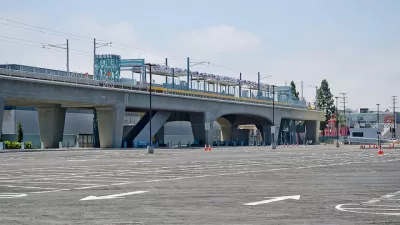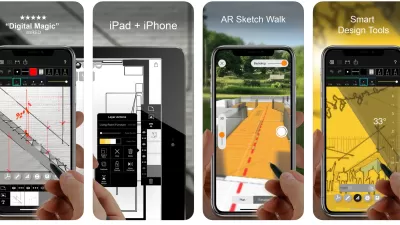Transit schedules, especially for buses, are notoriously inaccurate. A new app seeks to give a better picture of the status of the bus or train you keep trying to spot in the distance.
Moovit is the name of a new app "that crowdsources data from riders to provide a more complete image of what a trip is like," explains Zak Stone. Kind of like a Yelp for transit, that also happens to track your movements, Moovit gathers information from riders to help determine whether your ride is running on schedule. "Moovit piles that crowdsourced data onto layers of information you’d expect any transit app to work with—train and bus schedules plus municipally provided real-time vehicle data (when available)—to come up with as accurate a representation of a given ride as they can muster. Using that knowledge, Moovit can then make more nuanced trip plans, suggesting alternative routes that are perhaps less crowded or quicker."
In only two months, Moovit has attracted "more than 400,000 users in seven countries and 20 major urban areas, including Los Angeles, Rio de Janeiro, Madrid, Tel Aviv, and New York." And sustaining that type of growth will be crucial to the app's success, explains Stone. "Crowdsourcing data requires a crowd after all, and unless Moovit can recruit a minimum of 20,000 to 30,000 users-cum-data gatherers in most cities it serves, the app won’t live up to its promise and could end up as just another icon cluttering your phone’s home screen. Another problem is gathering data from users when they’re in the cell phone dead zone of the subway. But according to Gigaom, Moovit has raised $3.6 million, so they’ll have a lot of time and money to figure that out."
FULL STORY: An App That Uses Frustrated Riders’ Phones To Tell You That The Bus Will Be Late

Maui's Vacation Rental Debate Turns Ugly
Verbal attacks, misinformation campaigns and fistfights plague a high-stakes debate to convert thousands of vacation rentals into long-term housing.

Planetizen Federal Action Tracker
A weekly monitor of how Trump’s orders and actions are impacting planners and planning in America.

San Francisco Suspends Traffic Calming Amidst Record Deaths
Citing “a challenging fiscal landscape,” the city will cease the program on the heels of 42 traffic deaths, including 24 pedestrians.

Defunct Pittsburgh Power Plant to Become Residential Tower
A decommissioned steam heat plant will be redeveloped into almost 100 affordable housing units.

Trump Prompts Restructuring of Transportation Research Board in “Unprecedented Overreach”
The TRB has eliminated more than half of its committees including those focused on climate, equity, and cities.

Amtrak Rolls Out New Orleans to Alabama “Mardi Gras” Train
The new service will operate morning and evening departures between Mobile and New Orleans.
Urban Design for Planners 1: Software Tools
This six-course series explores essential urban design concepts using open source software and equips planners with the tools they need to participate fully in the urban design process.
Planning for Universal Design
Learn the tools for implementing Universal Design in planning regulations.
Heyer Gruel & Associates PA
JM Goldson LLC
Custer County Colorado
City of Camden Redevelopment Agency
City of Astoria
Transportation Research & Education Center (TREC) at Portland State University
Jefferson Parish Government
Camden Redevelopment Agency
City of Claremont




























